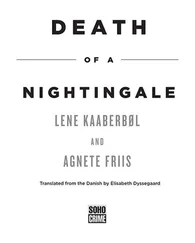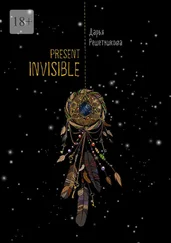Lene Kaaberbol - Invisible Murder
Здесь есть возможность читать онлайн «Lene Kaaberbol - Invisible Murder» весь текст электронной книги совершенно бесплатно (целиком полную версию без сокращений). В некоторых случаях можно слушать аудио, скачать через торрент в формате fb2 и присутствует краткое содержание. Год выпуска: 2012, ISBN: 2012, Издательство: Soho Crime, Жанр: Старинная литература, на английском языке. Описание произведения, (предисловие) а так же отзывы посетителей доступны на портале библиотеки ЛибКат.
- Название:Invisible Murder
- Автор:
- Издательство:Soho Crime
- Жанр:
- Год:2012
- ISBN:9781616951719
- Рейтинг книги:5 / 5. Голосов: 1
-
Избранное:Добавить в избранное
- Отзывы:
-
Ваша оценка:
- 100
- 1
- 2
- 3
- 4
- 5
Invisible Murder: краткое содержание, описание и аннотация
Предлагаем к чтению аннотацию, описание, краткое содержание или предисловие (зависит от того, что написал сам автор книги «Invisible Murder»). Если вы не нашли необходимую информацию о книге — напишите в комментариях, мы постараемся отыскать её.
Invisible Murder — читать онлайн бесплатно полную книгу (весь текст) целиком
Ниже представлен текст книги, разбитый по страницам. Система сохранения места последней прочитанной страницы, позволяет с удобством читать онлайн бесплатно книгу «Invisible Murder», без необходимости каждый раз заново искать на чём Вы остановились. Поставьте закладку, и сможете в любой момент перейти на страницу, на которой закончили чтение.
Интервал:
Закладка:
And it wasn’t because he hadn’t been paying attention. He’d been watching the experts on TV talking about the Summit and those dirty bombs—they always used the English words for “Summit” and “dirty bomb” even though Danish had perfectly adequate terms. He didn’t understand why everything had to be English these days. He had listened to investigative radio reports about the problem of radioactive materials from Eastern Europe. He had plodded his way through that long article in Berlingske Tidende on “Why Denmark is a Target.” He had also seen that documentary everyone was talking about—“The Making of a Terrorist” or something like that—about madrassas and training camps for suicide bombers. That video clip still stuck in his mind, the one of a young Muslim girl, no more than fourteen, talking about the greatness of Allah with a mixture of fear and pride in the dark gleam of her eyes a day before she blew herself and fourteen other people to smithereens on a street in eastern Bagdad.
He thought about the minarets in his backyard and of the dapper Mr. Hosseini and his mosque. It was hard to imagine Mr. Hosseini with an explosive belt full of TNT, but what did a terrorist actually look like?
They had asked about whether the Opel had been stolen, and he had said no. But now it suddenly occurred to him that there had been that day a few weeks ago when he’d had to adjust the seat. It was much farther forward than he cared for, which had puzzled him. Should he call the police lady and tell her that? What if someone had taken the car and put it back again without his having noticed?
Yet another stab in his chest. The pills. First he had to take one of those pills.
He trundled into the bathroom, careful not to hurry even though he was increasingly afraid that this was a heart attack coming on. Helle had put all his medications into a lunch-box-sized, white plastic crate in the cabinet over the sink. Centyl, aspirin, Fortzaar, Gaviscon, Nitromex. He shook a blister pack from the box, pressed the little tablet out of the foil, and put it under his tongue. There. Now it was just a matter of waiting. Breathing nice and easy, nice and easy. He sat down on the lid of the toilet and closed his eyes.
Then he opened them again. Because there was something was missing, wasn’t there?
Centyl, aspirin, Fortzaar, Gaviscon, Nitromex … but no box of Imovane. His sleeping pills were missing from the white crate.
He got up to see if they were elsewhere in the cabinet and was overcome by a sudden wave of dizziness. He made a grab for the sink. The medicine crate flew off to one side and the Centyl bottle hit the toilet tank with a crack and shattered, scattering shards of glass and pale-green pills all over the floor tiles.
Skou-Larsen clung to the sink for a few minutes until his dizziness subsided. Pathetic old wreck, he snarled at himself. Hopeless, helpless, useless old man. What was that crude phrase of Claus’s? Couldn’t take a crap without busting the crapper.
Saying the word crap helped a little, even though it had just been quietly to himself. He tried again.
“Crap,” he whispered to himself. “Everything is crap.”
His respectable upbringing stirred uncomfortably in him. But where had it actually gotten him, being so impeccably decent his whole life? It hadn’t protected him from having the police invade his home. And it certainly hadn’t kept his marriage alive. His sense of propriety had settled like a membrane between him and Helle so they walked around playing their carefully rehearsed roles without ever talking about anything that really mattered.
Enough of that, he decided. When she comes home, I’m going to talk to her. Really talk to her.
He decided he had better clean up the broken glass first. And gather up the pills. There was no reason to let her see how close he had come to fainting. His physical frailty was only all too noticeable as it was.
It had been years since he had touched the vacuum cleaner, but he did know where it was—in the closet under the stairs. An older model Nilfisk, good Danish quality and very durable.
There was a padded envelope in the vacuum closet, on the shelf next to the vacuum bags and the neatly folded stack of dust cloths. A grayish-white envelope without an address.
What’s that doing there? he thought. What a strange place to put it.
He opened it and peered into it.
It was full of five hundred kroner bills, and it didn’t take him long to guess how much was in there.
About six hundred thousand kroner.
 ØREN HAD BROUGHTthe girl up from the basement and into the kitchen. His plan had been to suggest a cup of coffee to distract her and make the situation feel more normal, but the only visible coffee-making equipment was an espresso monstrosity the size of a small space station, and with the clock ticking in his head, the whole palaver of grinding beans and fumbling around with the settings and weird little filters was simply insurmountable.
ØREN HAD BROUGHTthe girl up from the basement and into the kitchen. His plan had been to suggest a cup of coffee to distract her and make the situation feel more normal, but the only visible coffee-making equipment was an espresso monstrosity the size of a small space station, and with the clock ticking in his head, the whole palaver of grinding beans and fumbling around with the settings and weird little filters was simply insurmountable.
The girl sensed his skepticism, and a tiny little pseudo-smile raised one corner of her mouth.
“We never use,” she said. “Too hard.”
She said “we,” he noticed.
“Is Tommi your boyfriend?” Søren asked.
Her smile disappeared as if someone had erased it. She nodded, one time, a quick, abrupt motion.
“Where is he?” Søren asked, without much hope of receiving a helpful answer. Nor did he get one. She just shook her head.
“He not tell me.”
Where was she from? Somewhere in Eastern Europe, probably, from the look of her. And if the Italian passport was bought in Italy, then it was likely to be one of the more southerly countries—former Yugoslavia, Bulgaria, maybe Albania. The false passport was probably as much to hide her age as her nationality, he guessed.
“How old are you, Mini?” he asked, to have some kind of baseline for what she looked like when she was lying.
“Nineteen.” She looked him straight in the eye, but she couldn’t keep her hands still. One hand flopped around restlessly in her lap, and as soon as she had delivered her lie, she looked away.
Good. One more time, just to test the theory. “Where are you from? What country?”
“I am Italian girl.” She looked at him, and this time both her hands and her feet were fidgety. Little Mini didn’t like to lie.
He asked a couple of neutral questions and determined that she had been in Denmark for four months, that she had come to do some modeling work, that she was going to be in a movie soon. She actually believed all of this; Søren had to restrain a dark, bitter rage that wouldn’t have done the interview the least bit of good. It was certainly possible, he thought, that they intended to film her. But the very idea of the kind of movie it would be made him want to smear Tommi Karvinen over a wide swath of Amager’s asphalt.
Then he asked again if she knew where Karvinen was. And she fidgeted restlessly with one hand when she said no.
“Mini,” he said in the plainest, clearest English he could think of. “He took a girl. A Danish girl. She’s fourteen years old.”
She didn’t say anything, but the light in her eyes, which had sparked to life when she talked about her modeling career and her movie plans, died away again.
“Where did he take her?” Søren asked.
She pulled all her limbs in close to her body, like a spider when you blew on it. Self-preservation. Extreme self-preservation.
“Where is she?” he asked gently. “Don’t you want to help her?”
She was hyperventilating. He could both see it and hear it. Slowly she keeled to one side on the chair. When he realized the chair was about to tip over, he reached out a hand to stop it, but he was a second too late. She slid onto the floor and lay there with her knees pulled up against her chest and her eyes closed. She actually had fainted, Søren confirmed. She wasn’t pretending.
Читать дальшеИнтервал:
Закладка:
Похожие книги на «Invisible Murder»
Представляем Вашему вниманию похожие книги на «Invisible Murder» списком для выбора. Мы отобрали схожую по названию и смыслу литературу в надежде предоставить читателям больше вариантов отыскать новые, интересные, ещё непрочитанные произведения.
Обсуждение, отзывы о книге «Invisible Murder» и просто собственные мнения читателей. Оставьте ваши комментарии, напишите, что Вы думаете о произведении, его смысле или главных героях. Укажите что конкретно понравилось, а что нет, и почему Вы так считаете.












